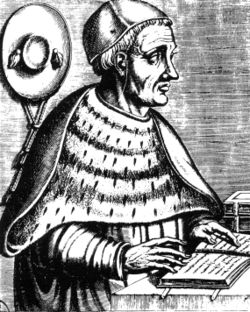Pierre d'Ailly
Jump to navigation
Jump to search
| Cogito ergo sum Logic and rhetoric |
| Key articles |
| General logic |
| Bad logic |
Pierre d'Ailly (1351–1420) was a logician and cardinal of the Catholic Church in the 14th century. d'Ailly is known for his skeptical writings which, building on the nominalism of William of Ockham, criticized the philosophical proofs for God's existence made by Thomas Aquinas. d'Ailly was neither an agnostic nor atheist, but believed that religious faith is supported only by scripture and the authority of the institution, rather than being a question of logic. d'Ailly's best known syllogism tackles Aquinas' Aristotelian Argument from Motion for the existence of God and runs as follows:
- It is not self-evident that an object has been moved; this movement may be only apparent.
- Assuming that the object is actually in motion, it is not self-evident that this motion was caused by another object.
- Assuming that all motion in an object is derived from another object and assuming that there cannot be a series of movers that continues ad infinitum, a first "unmoved mover" can still not be inferred, because the first mover may be unmoved only at present.
- It is entirely possible that that there is a cycle of causes and effects (i.e. A causes B, B causes C, C causes A.)
- The possibility of an infinite number of essentially ordered (God-created?) causes cannot be ruled out.
- The mere fact an object exists anew does not require that the object was produced.
- A satisfactory explanation has never been given for what it means for an object to be effected/produced by another object.
d'Ailly concludes that it is impossible to use logic to substantiate truth, although logic may be used to calculate an argument's probability.
